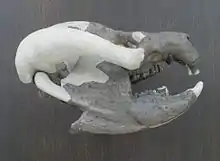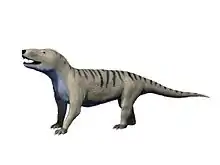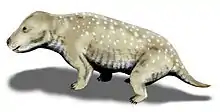Bienotherium
Bienotherium is an extinct genus of cynodonts from the Early Jurassic of China.[2] Despite its size, it is closely related to Lufengia, and is the largest tritylodont from the Lufeng Formation in China.[3]
| Bienotherium | |
|---|---|
 | |
| Bienotherium yuannanese | |
| Scientific classification | |
| Kingdom: | Animalia |
| Phylum: | Chordata |
| Clade: | Therapsida |
| Clade: | Cynodontia |
| Family: | †Tritylodontidae |
| Genus: | †Bienotherium Young, 1940[1] |
| Species | |
| Synonyms | |
| |
Bienotherium had four incisors, no canines, and back molar-like teeth, which it used to chew tough plant material.[4]
Description
Bienotherium is defined as being big and robust compared to other tritylodonts, and also by exposed maxillaries in the skull, an unusually long diastema and thin zygomatic bone.[3]
References
- "The Paleobiology Database". Archived from the original on July 18, 2011. Retrieved May 21, 2010.
- "Palæos Vertebrates". Archived from the original on December 19, 2008. Retrieved May 21, 2010.
- Lucas, Spencer G. (2001). Chinese Fossil Vertebrates. New York City, Chichester, West Sussex: Columbia University Press. p. 133. ISBN 0-231-08482-X. Retrieved May 24, 2010.
- Blount, Kitty; Crowley, Maggie; Bada, Kathleen; Malyan, Susan; Sparrow, Giles; Thiro, Rosalyn; Walisiewicz, Marek, eds. (2008) [2001]. Encyclopedia of Dinosaurs and Other Prehistoric Life. New York City: DK Publishing Special Markets. p. 203. ISBN 978-0-7566-3836-8.
This article is issued from Wikipedia. The text is licensed under Creative Commons - Attribution - Sharealike. Additional terms may apply for the media files.







